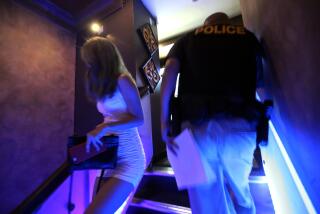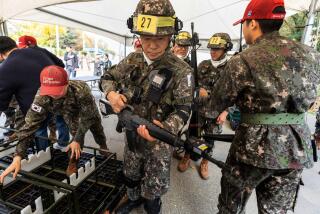Tension among the masseurs
Seoul — Cho Ok-bun’s fingers are long and strong, and in the days before they started to cramp with age they could massage muscles until knots loosened and stress was flicked away.
She rolls your fingers in hers. She squeezes your palm. She says she can tell if you’re healthy just by touching your hands.
Touch is Cho’s livelihood and touch is all she has: The 63-year-old has been blind since birth, and claims she would have been condemned to a life of waiting for charity were it not for being a trained masseuse.
And here in South Korea, the law says only the blind can give a massage.
“It’s the only job I can do,” Cho says softly, feet tucked under knees on a mat in a small residence next to the Korean Church for the Blind in downtown Seoul. She once dreamed of other possibilities. “I had a desire to become a teacher, and I’ve heard that, abroad, the blind can become telephone operators,” she says wistfully.
“But there are limitations. It’s good fortune that I am granted this right.”
The law giving only the legally blind the right to become registered masseurs was introduced under Japanese occupation in 1913 and reaffirmed by South Korea 50 years later, a way for the state to give the visually impaired a chance to earn a living in a culture prone to ostracizing the disabled.
But that aim has now collided with South Korea’s constitutional guarantees against discrimination. Masseurs who are not blind and want to offer sports therapy or give facial and foot massages have long complained that the law is biased.
And they have decided to fight.
“Why is our business illegal in Korea when in all other countries around the world it’s perfectly legal?” asks Lee Dong-yup, president of the Korea Meridians Assn., which lobbies for about 300,000 masseurs who are not legally licensed -- although many are working anyway, openly and without being harassed by police or inspectors.
“Our members are people who want to work proudly, legally, pay taxes, run a transparent and successful business, and write the name of their profession in their children’s school family-registration card.”
In May, South Korea’s Constitutional Court agreed with the sighted. It struck down the “blind massage” law, ruling it discriminatory.
That’s when the clash got messy.
Blind masseurs saw the ruling as nothing less than a threat to their survival. Some were even prepared to die to overturn it.
In Seoul, the capital, blind activists leaped from buildings and onto subway tracks in protest. Two died. Hundreds of others and their supporters protested daily in front of the National Assembly. Dozens more gathered on a bridge across the Han River to bang their canes in protest. A few jumped and had to be rescued by police.
The high-profile protest “is embarrassing for Korea, because it shows the world how badly we treat people with disabilities, and I regret that,” says Yang Hee-sung, the visually impaired head of diagnostics at the vocational campus of the Seoul School for the Blind. The school is one of 13 that cater to visually impaired adults in a country where an estimated 180,000 people are legally blind.
“But we have been guaranteed a job for almost a hundred years,” he says. “And we have to guard our rights.”
Pressured by the emotional protests, the South Korean government bent. In August, the National Assembly passed a new regulation under the state medical code restoring the blind’s exclusive right to give massages.
A group of 320 sighted masseurs responded with another lawsuit, asking the Constitutional Court to again rule against the restriction. No hearing date has been set.
The conflicting demands for equality have left even human rights advocates uncertain about whether a law that favors the blind is leveling the occupational playing field or condemning them to an occupational ghetto -- while discriminating against others in the process.
The National Commission for Human Rights has not taken a side. “It may seem to be just a question of having [freedom] to choose a vocation,” says Seo Young-ho, the commission’s officer in charge of disability discrimination. “But what is not widely known among ordinary people is that the visually disabled face severe limitations in Korea.”
The estimated 6,000 blind South Koreans with certificates allowing them to provide massages earn enough money to live more independent lives; virtually all the rest are dependent on state assistance.
“The difference between their standards of living is incredible,” Yang says, although it is widely acknowledged that the massage business is still stuck operating as a cottage industry. Blind masseurs keep a discreet presence. Unlike many major Asian airports, for example, Seoul’s terminals don’t have massage clinics at the gates. Instead, the blind work mostly out of their own homes or hotels, where the front desk will arrange for a traditional muscle relief massage the Koreans call an anma.
Lee, the advocate for sighted masseurs, says many blind masseurs are exploited by the sex industry, which will frequently hire a certified masseur as an “honorary chairman” along with a few other blind masseuses to act as a front for sexual services.
“The blind masseuse gives customers a 10-minute massage, receives about 10,000 won [$11], and then leaves so that the ‘girls’ can come in,” Lee says. “Their job is more likely illegal than ours.”
The original decision to bestow a special right on the blind was imposed by the Japanese, who had long reserved work such as massage and acupuncture for those without sight in their own country. Japan’s first vocational school for the blind opened in 1878 in Kyoto, and the Japanese brought the practice with them as they occupied the Korean peninsula in the early 20th century.
“The law did not come about because the Japanese thought we were being treated poorly,” says Yang of the Seoul school. “It was a manpower issue. They needed people to give massages, and there weren’t enough blind Japanese people in the country to meet the demand.”
The irony of Koreans struggling to preserve a legacy of the Japanese occupation is not lost on him.
“The Japanese annexation period has a very unfortunate history,” he acknowledges. “But in a way, it was a great time for the blind.”
Blind masseurs took a hit when the Japanese were chased from Korea in 1945 and the certificate system suspended under the American military government, which refused to recognize the medical benefits of massage, Yang says. But the blind’s exclusive rights were restored in the 1963 constitution introduced under then-President Park Chung-hee.
The sighted masseurs say they are not trying to drive the blind out of business. Lee says his masseurs merely want to offer different services from the therapeutic anmas given by the blind.
“Our massage is completely different,” he says. “Our customers come for aesthetic reasons, not to receive health treatments. The age group is getting younger: people looking for jobs who want to look nicer by losing weight.”
The two could coexist, he suggests.
Blind masseuses such as Cho shake their heads at the notion.
“They say, ‘What’s so bad about sharing?’ ” she says, shifting on her knees, her hands kneading an imaginary back. “But if they become legal, customers will want to get their massages from someone prettier and younger.
“Who,” she asks, her face tilted upward, “will choose to have a massage from someone whose eyes are closed?”
*
Times staff writer Jinna Park contributed to this report.
More to Read
Sign up for Essential California
The most important California stories and recommendations in your inbox every morning.
You may occasionally receive promotional content from the Los Angeles Times.










